中国成语典故英文翻译演示教学
- 格式:doc
- 大小:19.00 KB
- 文档页数:3
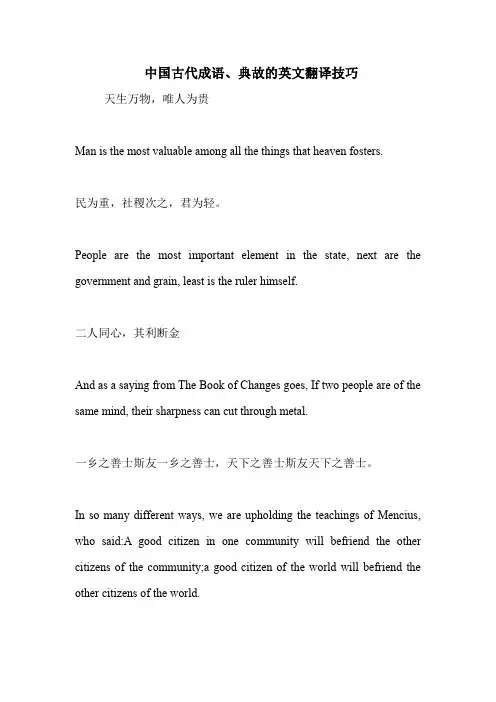
中国古代成语、典故的英文翻译技巧天生万物,唯人为贵Man is the most valuable among all the things that heaven fosters.民为重,社稷次之,君为轻。
People are the most important element in the state, next are the government and grain, least is the ruler himself.二人同心,其利断金And as a saying from The Book of Changes goes, If two people are of the same mind, their sharpness can cut through metal.一乡之善士斯友一乡之善士,天下之善士斯友天下之善士。
In so many different ways, we are upholding the teachings of Mencius, who said:A good citizen in one community will befriend the other citizens of the community;a good citizen of the world will befriend the other citizens of the world.不登高山,不知天之高也;不临深渊,不知地之厚也。
One can never be aware of the height of the sky or the depth of the earth, if he does not climb up a high mountain or look down into a deep abyss.但愿人长久,千里共婵娟。
We wigh each other a long life so as to share the beauty of this graceful moonlight, even though miles apart.独在异乡为异客,每逢佳节倍思亲。
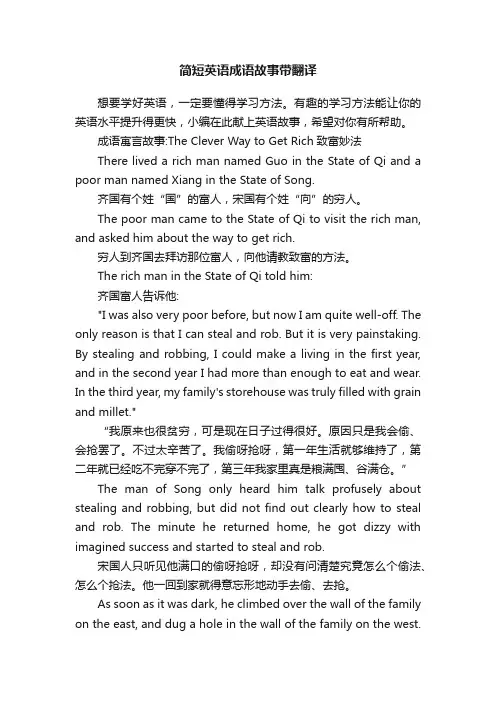
简短英语成语故事带翻译想要学好英语,一定要懂得学习方法。
有趣的学习方法能让你的英语水平提升得更快,小编在此献上英语故事,希望对你有所帮助。
成语寓言故事:The Clever Way to Get Rich致富妙法There lived a rich man named Guo in the State of Qi and a poor man named Xiang in the State of Song.齐国有个姓“国”的富人,宋国有个姓“向”的穷人。
The poor man came to the State of Qi to visit the rich man, and asked him about the way to get rich.穷人到齐国去拜访那位富人,向他请教致富的方法。
The rich man in the State of Qi told him:齐国富人告诉他:"I was also very poor before, but now I am quite well-off. The only reason is that I can steal and rob. But it is very painstaking. By stealing and robbing, I could make a living in the first year, and in the second year I had more than enough to eat and wear. In the third year, my family's storehouse was truly filled with grain and millet."“我原来也很贫穷,可是现在日子过得很好。
原因只是我会偷、会抢罢了。
不过太辛苦了。
我偷呀抢呀,第一年生活就够维持了,第二年就已经吃不完穿不完了,第三年我家里真是粮满囤、谷满仓。
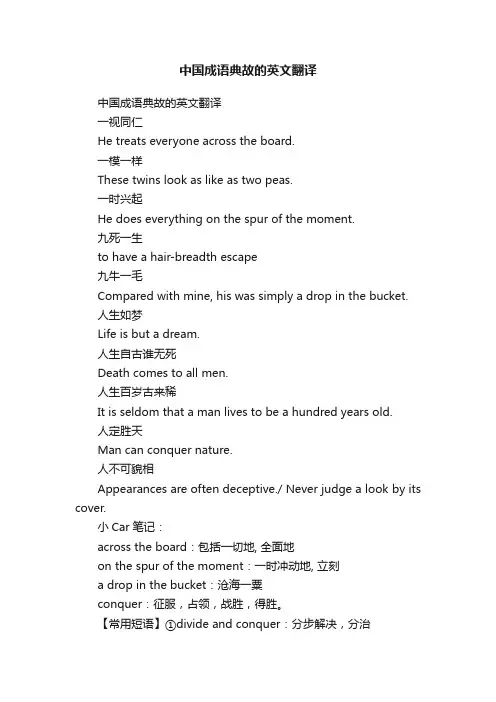
中国成语典故的英文翻译
中国成语典故的英文翻译
一视同仁
He treats everyone across the board.
一模一样
These twins look as like as two peas.
一时兴起
He does everything on the spur of the moment.
九死一生
to have a hair-breadth escape
九牛一毛
Compared with mine, his was simply a drop in the bucket.
人生如梦
Life is but a dream.
人生自古谁无死
Death comes to all men.
人生百岁古来稀
It is seldom that a man lives to be a hundred years old.
人定胜天
Man can conquer nature.
人不可貌相
Appearances are often deceptive./ Never judge a look by its cover.
小Car笔记:
across the board:包括一切地, 全面地
on the spur of the moment:一时冲动地, 立刻
a drop in the bucket:沧海一粟
conquer:征服,占领,战胜,得胜。
【常用短语】①divide and conquer:分步解决,分治
②stoop to conquer:降低自己的身分去...。
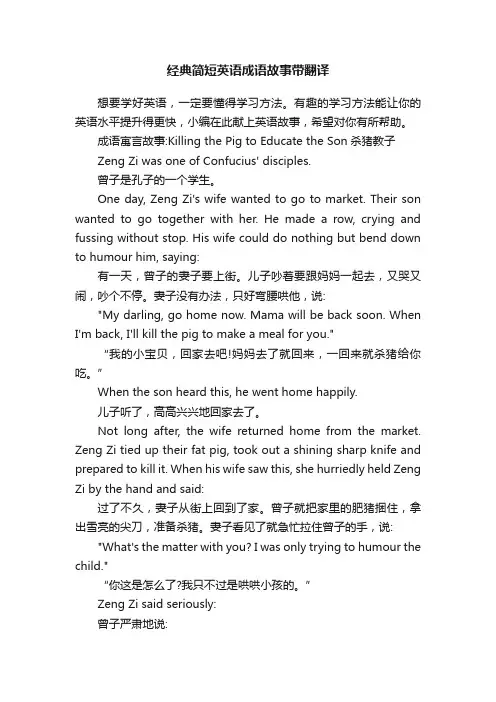
经典简短英语成语故事带翻译想要学好英语,一定要懂得学习方法。
有趣的学习方法能让你的英语水平提升得更快,小编在此献上英语故事,希望对你有所帮助。
成语寓言故事:Killing the Pig to Educate the Son杀猪教子Zeng Zi was one of Confucius' disciples.曾子是孔子的一个学生。
One day, Zeng Zi's wife wanted to go to market. Their son wanted to go together with her. He made a row, crying and fussing without stop. His wife could do nothing but bend down to humour him, saying:有一天,曾子的妻子要上街。
儿子吵着要跟妈妈一起去,又哭又闹,吵个不停。
妻子没有办法,只好弯腰哄他,说:"My darling, go home now. Mama will be back soon. When I'm back, I'll kill the pig to make a meal for you."“我的小宝贝,回家去吧!妈妈去了就回来,一回来就杀猪给你吃。
”When the son heard this, he went home happily.儿子听了,高高兴兴地回家去了。
Not long after, the wife returned home from the market. Zeng Zi tied up their fat pig, took out a shining sharp knife and prepared to kill it. When his wife saw this, she hurriedly held Zeng Zi by the hand and said:过了不久,妻子从街上回到了家。
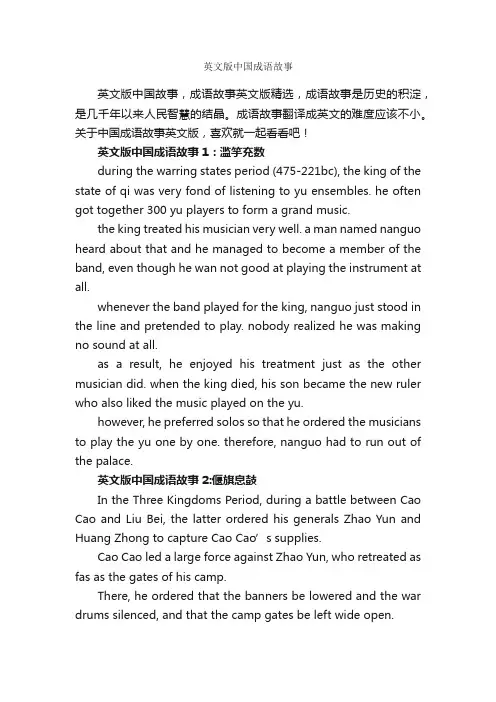
英文版中国成语故事英文版中国故事,成语故事英文版精选,成语故事是历史的积淀,是几千年以来人民智慧的结晶。
成语故事翻译成英文的难度应该不小。
关于中国成语故事英文版,喜欢就一起看看吧!英文版中国成语故事1:滥竽充数during the warring states period (475-221bc), the king of the state of qi was very fond of listening to yu ensembles. he often got together 300 yu players to form a grand music.the king treated his musician very well. a man named nanguo heard about that and he managed to become a member of the band, even though he wan not good at playing the instrument at all.whenever the band played for the king, nanguo just stood in the line and pretended to play. nobody realized he was making no sound at all.as a result, he enjoyed his treatment just as the other musician did. when the king died, his son became the new ruler who also liked the music played on the yu.however, he preferred solos so that he ordered the musicians to play the yu one by one. therefore, nanguo had to run out of the palace.英文版中国成语故事2:偃旗息鼓In the Three Kingdoms Period, during a battle between Cao Cao and Liu Bei, the latter ordered his generals Zhao Yun and Huang Zhong to capture Cao Cao’s supplies.Cao Cao led a large force against Zhao Yun, who retreated as fas as the gates of his camp.There, he ordered that the banners be lowered and the war drums silenced, and that the camp gates be left wide open.Zhao Yun then stationed(安置,驻扎) his troops in ambush(埋伏) nearly. When Cao Cao arrived and saw the situation, he immediately suspected a trap and withdrew his forces.This idiom is nowadays used to indicate metaphorically(隐喻地) halting an attack or ceasing all activities.英文版中国成语故事3:破镜重圆in the northern and southern dynasties when the state of chen (a.d. 557-589) was facing its demise(死亡,终止) , xu deyan, husband of the princess, broke a bronze mirror into halves.each of them kept a half as tokens(代币,符号) in case they were separated. soon afterwards, they did lose touch with each other, but the two halves of the mirror enabled them to be reunited.this idiom is used to refer to the reunion of a couple after they lose touch or break up.成语故事是中国所特有的,总感觉翻译成英文的就变了味儿。
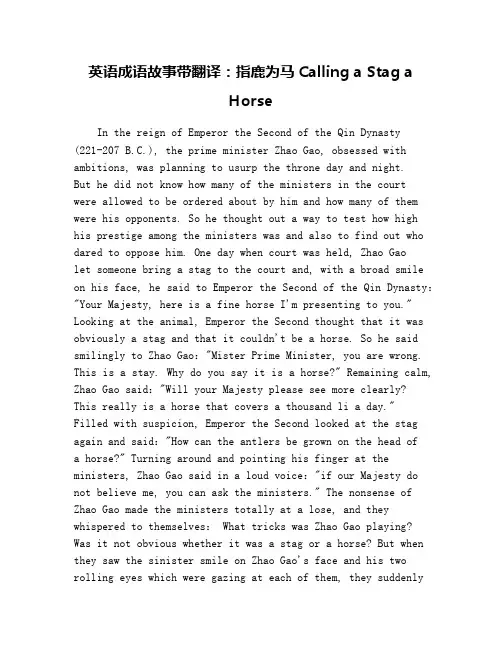
英语成语故事带翻译:指鹿为马Calling a Stag aHorseIn the reign of Emperor the Second of the Qin Dynasty (221-207 B.C.), the prime minister Zhao Gao, obsessed with ambitions, was planning to usurp the throne day and night.But he did not know how many of the ministers in the court were allowed to be ordered about by him and how many of them were his opponents. So he thought out a way to test how high his prestige among the ministers was and also to find out who dared to oppose him. One day when court was held, Zhao Gaolet someone bring a stag to the court and, with a broad smile on his face, he said to Emperor the Second of the Qin Dynasty:"Your Majesty, here is a fine horse I'm presenting to you." Looking at the animal, Emperor the Second thought that it was obviously a stag and that it couldn't be a horse. So he said smilingly to Zhao Gao:"Mister Prime Minister, you are wrong. This is a stay. Why do you say it is a horse?" Remaining calm, Zhao Gao said:"Will your Majesty please see more clearly?This really is a horse that covers a thousand li a day."Filled with suspicion, Emperor the Second looked at the stag again and said:"How can the antlers be grown on the head ofa horse?" Turning around and pointing his finger at the ministers, Zhao Gao said in a loud voice:"if our Majesty do not believe me, you can ask the ministers." The nonsense of Zhao Gao made the ministers totally at a lose, and they whispered to themselves: What tricks was Zhao Gao playing? Was it not obvious whether it was a stag or a horse? But when they saw the sinister smile on Zhao Gao's face and his two rolling eyes which were gazing at each of them, they suddenlyunderstood his evil intentions. Some of the ministers whowere timid and yet had a sense of right eousness did not dare to say anything, because to tell lies would make their conscience uneasy and to tell the truth would mean that they would be persecuted by Zhao Gao later. Some ministers with a sense of justice persisted that it was a stag and not a horse. There were still some crafty and fawning ministers whofollowed Zhao Gao closely in ordinary times. They immediately voiced their support to Zhao Gao, saying to the emperor:"This really in a horse that covers a thousand li a day."After the event, Zhao Gao punished by various means those ministers with a sense of justice who were not obedient to him, even with whole families of some of those ministers executed. This story appears in "The Life of the First Emperor of the Qin Dynasty" in The Historical Records written by Sima Qian. From this story people have derived the set phrase "calling a stag a horse" to mean deliberately misrepresenting some thing and misleading the public.秦二世时,丞相赵高野心勃勃,日夜盘算着要篡夺皇位。
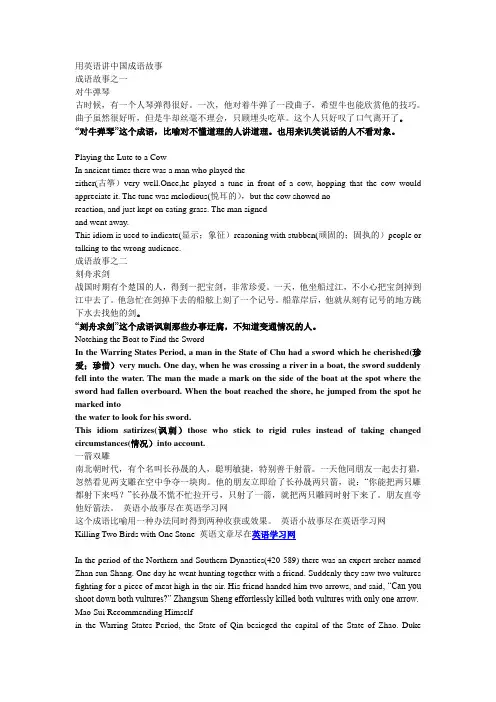
用英语讲中国成语故事成语故事之一对牛弹琴古时候,有一个人琴弹得很好。
一次,他对着牛弹了一段曲子,希望牛也能欣赏他的技巧。
曲子虽然很好听,但是牛却丝毫不理会,只顾埋头吃草。
这个人只好叹了口气离开了。
“对牛弹琴”这个成语,比喻对不懂道理的人讲道理。
也用来讥笑说话的人不看对象。
Playing the Lute to a CowIn ancient times there was a man who played thezither(古筝)very well.Once,he played a tune in front of a cow, hopping that the cow would appreciate it. The tune was melodious(悦耳的),but the cow showed noreaction, and just kept on eating grass. The man signedand went away.This idiom is used to indicate(显示;象征)reasoning with stubben(顽固的;固执的)people or talking to the wrong audience.成语故事之二刻舟求剑战国时期有个楚国的人,得到一把宝剑,非常珍爱。
一天,他坐船过江,不小心把宝剑掉到江中去了。
他急忙在剑掉下去的船舷上刻了一个记号。
船靠岸后,他就从刻有记号的地方跳下水去找他的剑。
“刻舟求剑”这个成语讽刺那些办事迂腐,不知道变通情况的人。
Notching the Boat to Find the SwordIn the Warring States Period, a man in the State of Chu had a sword which he cherished(珍爱;珍惜)very much. One day, when he was crossing a river in a boat, the sword suddenly fell into the water. The man the made a mark on the side of the boat at the spot where the sword had fallen overboard. When the boat reached the shore, he jumped from the spot he marked intothe water to look for his sword.This idiom satirizes(讽刺)those who stick to rigid rules instead of taking changed circumstances(情况)into account.一箭双雕南北朝时代,有个名叫长孙晟的人,聪明敏捷,特别善于射箭。
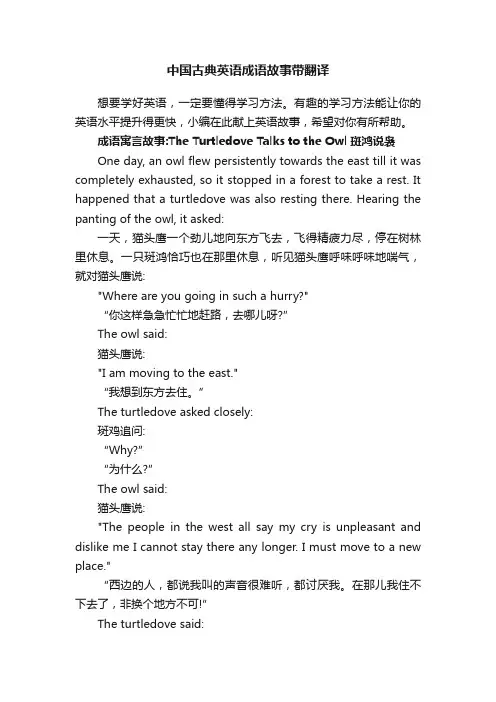
中国古典英语成语故事带翻译想要学好英语,一定要懂得学习方法。
有趣的学习方法能让你的英语水平提升得更快,小编在此献上英语故事,希望对你有所帮助。
成语寓言故事:The Turtledove Talks to the Owl斑鸿说袅One day, an owl flew persistently towards the east till it was completely exhausted, so it stopped in a forest to take a rest. It happened that a turtledove was also resting there. Hearing the panting of the owl, it asked:一天,猫头鹰一个劲儿地向东方飞去,飞得精疲力尽,停在树林里休息。
一只斑鸿恰巧也在那里休息,听见猫头鹰呼味呼味地喘气,就对猫头鹰说:"Where are you going in such a hurry?"“你这样急急忙忙地赶路,去哪儿呀?”The owl said:猫头鹰说:"I am moving to the east."“我想到东方去住。
”The turtledove asked closely:斑鸡追问:“Why?”“为什么?”The owl said:猫头鹰说:"The people in the west all say my cry is unpleasant and dislike me I cannot stay there any longer. I must move to a new place."“西边的人,都说我叫的声音很难听,都讨厌我。
在那儿我住不下去了,非换个地方不可!”The turtledove said:"Can you solve your problem by changing a place? In my opinion, no matter where you move to, it won't help."“难道换个地方就可以解决问题吗?我看,不管你搬到哪里去,都没有用!”The owl felt rather angry at the words of the turtledove, but it still asked in surprise:猫头鹰觉得斑坞的话太气人,便惊奇地问:"Can you forecast the future?"“你能未卜先知?”The turtledove said:斑鸡说:"This is very simple. If you don't change your cry, the people in the east will dislike you all the same."“这很简单,如果你不改变你的叫声,那么东边的人也一样会讨厌你的!”成语寓言故事:Chasing a Woman Only to Lose His Wife追女失妻Zhao Jianzi, the famous general of the State of Jin, prepared to attack the State of Qi. He ordered:晋国名将赵简子准备出兵进攻齐国。
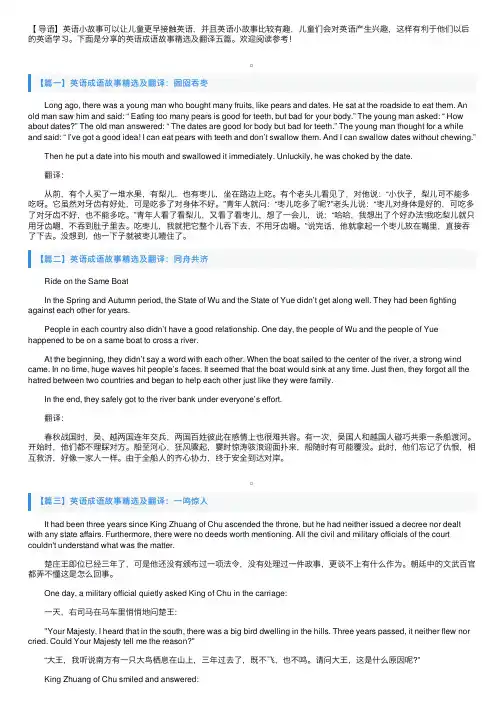
【导语】英语⼩故事可以让⼉童更早接触英语,并且英语⼩故事⽐较有趣,⼉童们会对英语产⽣兴趣,这样有利于他们以后的英语学习。
下⾯是分享的英语成语故事精选及翻译五篇。
欢迎阅读参考!【篇⼀】英语成语故事精选及翻译:囫囵吞枣 Long ago, there was a young man who bought many fruits, like pears and dates. He sat at the roadside to eat them. An old man saw him and said: “ Eating too many pears is good for teeth, but bad for your body.” The young man asked: “ How about dates?” The old man answered: “ The dates are good for body but bad for teeth.” The young man thought for a while and said: “ I’ve got a good idea! I can eat pears with teeth and don’t swallow them. And I can swallow dates without chewing.” Then he put a date into his mouth and swallowed it immediately. Unluckily, he was choked by the date. 翻译: 从前,有个⼈买了⼀堆⽔果,有梨⼉,也有枣⼉,坐在路边上吃。
有个⽼头⼉看见了,对他说:“⼩伙⼦,梨⼉可不能多吃呀。
它虽然对⽛齿有好处,可是吃多了对⾝体不好。
”青年⼈就问:“枣⼉吃多了呢?”⽼头⼉说:“枣⼉对⾝体是好的,可吃多了对⽛齿不好,也不能多吃。
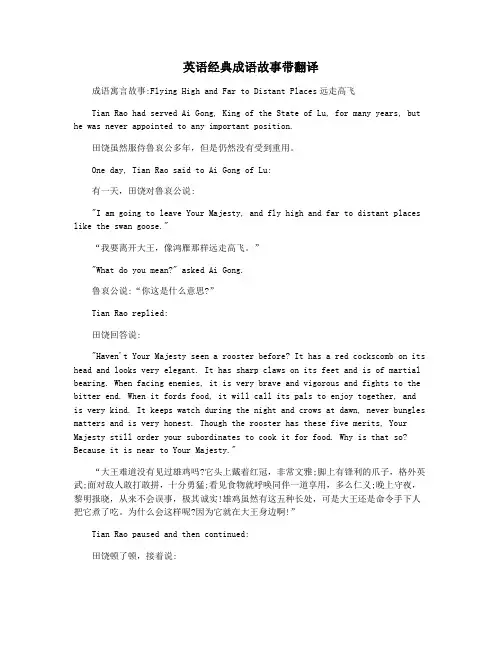
英语经典成语故事带翻译成语寓言故事:Flying High and Far to Distant Places远走高飞Tian Rao had served Ai Gong, King of the State of Lu, for many years, but he was never appointed to any important position.田饶虽然服侍鲁哀公多年,但是仍然没有受到重用。
One day, Tian Rao said to Ai Gong of Lu:有一天,田饶对鲁哀公说:"I am going to leave Your Majesty, and fly high and far to distant places like the swan goose."“我要离开大王,像鸿雁那样远走高飞。
”"What do you mean?" asked Ai Gong.鲁哀公说:“你这是什么意思?”Tian Rao replied:田饶回答说:"Haven't Your Majesty seen a rooster before? It has a red cockscomb on its head and looks very elegant. It has sharp claws on its feet and is of martial bearing. When facing enemies, it is very brave and vigorous and fights to the bitter end. When it fords food, it will call its pals to enjoy together, and is very kind. It keeps watch during the night and crows at dawn, never bungles matters and is very honest. Though the rooster has these five merits, Your Majesty still order your subordinates to cook it for food. Why is that so? Because it is near to Your Majesty."“大王难道没有见过雄鸡吗?它头上戴着红冠,非常文雅;脚上有锋利的爪子,格外英武;面对敌人敢打敢拼,十分勇猛;看见食物就呼唤同伴一道享用,多么仁义;晚上守夜,黎明报晓,从来不会误事,极其诚实!雄鸡虽然有这五种长处,可是大王还是命令手下人把它煮了吃。
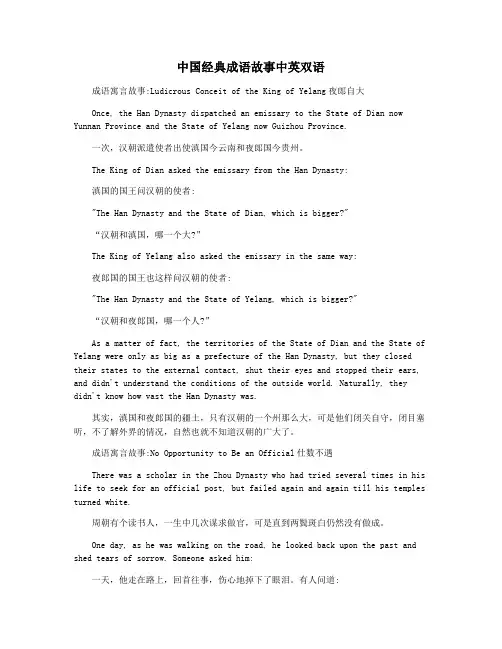
中国经典成语故事中英双语成语寓言故事:Ludicrous Conceit of the King of Yelang夜郎自大Once, the Han Dynasty dispatched an emissary to the State of Dian now Yunnan Province and the State of Yelang now Guizhou Province.一次,汉朝派遣使者出使滇国今云南和夜郎国今贵州。
The King of Dian asked the emissary from the Han Dynasty:滇国的国王问汉朝的使者:"The Han Dynasty and the State of Dian, which is bigger?"“汉朝和滇国,哪一个大?”The King of Yelang also asked the emissary in the same way:夜郎国的国王也这样问汉朝的使者:"The Han Dynasty and the State of Yelang, which is bigger?"“汉朝和夜郎国,哪一个人?”As a matter of fact, the territories of the State of Dian and the State of Yelang were only as big as a prefecture of the Han Dynasty, but they closed their states to the external contact, shut their eyes and stopped their ears, and didn't understand the conditions of the outside world. Naturally, they didn't know how vast the Han Dynasty was.其实,滇国和夜郎国的疆土,只有汉朝的一个州那么大,可是他们闭关自守,闭目塞听,不了解外界的情况,自然也就不知道汉朝的广大了。
成语故事英文Idioms are an important part of the Chinese language and culture. They are a unique form of expression that often carry deep meanings and stories behind them. In this document, we will explore some interesting Chinese idioms and their stories, and also provide their English translations for better understanding.1. "马到成功" (mǎ dào chéng gōng) "Success comes immediately upon arrival of the horse"This idiom originated from a story during the Warring States period. The King of Qin, Ying Zheng, was at war with other states. One day, he received news that his general had captured a city and achieved a great victory. The king was so happy that he immediately sent a messenger to reward the general. The messenger rode a horse and delivered the reward, hence the idiom "马到成功". In English, it can be translated as "Immediate success".2. "一箭双雕" (yī jiàn shuāng diāo) "Shoot two hawks with one arrow"This idiom comes from a story about a skilled archer named Zhou Yafu during the Spring and Autumn period. Once, Zhou went hunting and saw two hawks flying together. With one arrow, he managed to shoot down both hawks at the same time. This idiom is often used to describe a situation where one action achieves two goals. In English, it can be translated as "Kill two birds with one stone".3. "班门弄斧" (bān mén nòng fǔ) "Displaying one's axe before Lu Ban's door"This idiom originates from a story about a man named Bian He during the Spring and Autumn period. Bian He found a rare piece of wood and wanted to present it to the king to make a treasure. However, the king did not believe him and punished him by cutting off his feet. Years later, the wood was indeed made into a treasure. When the king realized his mistake and wanted to apologize, Bian He refused to see him, saying "班门弄斧". This idiom is usedto describe someone showing off their skills or knowledgein front of an expert. In English, it can be translated as "To teach fish to swim".4. "杯弓蛇影" (bēi gōng shé yǐng) "Seeing a snakein the bow after drinking"This idiom comes from a story about a man named Zhuangzi during the Warring States period. One day, Zhuangzi went on a trip with his friend. They stopped at an inn and drank some wine. After drinking, Zhuangzi picked up a bow and saw a reflection of the bowstring on the ground, mistaking it for a snake. This idiom is used to describe someone being overly suspicious or paranoid. In English, it can be translated as "Seeing a mountain out of a molehill".5. "画蛇添足" (huà shé tiān zú) "Dr awing legs on a snake"This idiom comes from a story about a man who wanted to show off his painting skills. He drew a lifelike snake, but then added legs to make it more complete. This idiom isused to describe unnecessary additions or overelaboration. In English, it can be translated as "Gild the lily".In conclusion, Chinese idioms are not only linguistic expressions, but also a reflection of Chinese history, culture and philosophy. By understanding the stories behind these idioms, we can gain a deeper appreciation for the richness and depth of the Chinese language.。
中国成语故事英文版XXX Wall"XXX was born into poverty but had a great love for reading。
He worked during the day and read at night。
but could not afforda candle to light his books。
One day。
he noticed that his neighbor had candles。
but the light did not reach his room。
So he dug a small hole in the wall to allow the light to pass through and XXX。
From then on。
he read every night until the candle burned out.XXX。
XXX all of his books and had nothing left to read。
So he went to a wealthy man's house and offered to work for him without pay。
When the rich man asked why he didn't want payment。
Kuang Heng replied。
"I only want to borrow your books." The rich man was XXX.Key Vocabulary and Phrases:candle: a stick of wax with a wick in the middle that gives off light when burnedgo through: to pass through somethingdug: the past tense of "dig," which means to break up and move soil or other material有一次,一个小偷看到邻居家门上挂着一个铃铛,想要偷走它。
中国成语故事中英对照想要学好英语,一定要懂得学习方法。
有趣的学习方法能让你的英语水平提升得更快,小编在此献上英语故事,希望对你有所帮助。
成语寓言故事:If the Lips Are Gone, the Teeth Will Be Cold唇亡齿寒Between the States of Jin and Guo was the State of Yu.晋国和掳国的中间,隔着一个虞国。
Once, the State of Jin intended to invade the State of Guo and had to seek for permission to go by way of the State of Yu. The King of Jin was worried that the State of Yu would refuse to consent.有一次,晋国要去进攻掳国,得向虞国借路,国王担心虞国不答应。
Xun Xi, a high official of the State of Jin, offered his scheme to the King. He said:晋国的大臣荀息向国王献计,说:"If you offer that piece of round jade and that fine steed as gifts to the King of Yu to ask his permission, he is sure to give his consent."“如果您把那块璧玉和那匹良马送给虞工,向他借路,那么他一定会答应的。
”The King of Jin said:晋王说:"The round jade from Chuiji is an heirloom from my ancestors. The fine steed from Qudi is a great favorite of mine. If the King of Yu accepted our gifts, yet would not give us permission, what shall we do then?"“垂棘的璧玉是我祖先的传家宝;屈地的良马是我最喜欢的骏马。
中国成语典故英文翻
译
一朝被蛇咬,十年怕草绳 Once bitten, twice shy.
一言既出,驷马难追 A word spoken is past recalling.
一见钟情 to fall in love at first sight
一箭双雕/一举两得 Kill two birds with one stone.
一寸光阴一寸金 Time is money.
一失足成千古恨
The error committed on impulse may turn out to be the sorrow of a whole life.
一将功名万古枯 What millions died that Caesar might be great.
一年之计在于春,一日之计在于晨
Plan your year in spring and your day at dawn.
一人难称百人意 You cannot please everyone.
一气呵成 Never make two bites of a cherry.
九死一生 to have a hair-breadth escape
九牛一毛 a drop in the bucket
人生如梦 Life is but a dream.
人生自古谁无死 Death comes to all men.
人不可貌相 Appearances are often deceptive./ Never judge a book by its cover. 人山人海 a sea of faces:How many people are there in the stadium? Believe it or not, a sea of faces.
人云亦云 echo others' words
人面兽心 a wolf in sheep's clothing
人言可畏 Opinion rules the world
十年风水轮流转 Every dog has its day.
十全十美 leave nothing to be desired
十拿九稳 win something in the bag.
十万火急 in hot haste
力不从心 my spirit is willing, but my flesh is weak
力挽狂澜 try to stem the tide
入乡随俗 Do in Rome as the Romans do.
七上八下 to be sixes and sevens
八面玲珑 smooth and able to win favour on all sides
千载难逢 It only happens once in a blue moon.
大言不惭 blow your own trumpet
大智若愚 He who cannot play the fool is not a wise man.
大海捞针 needle in a haystack
山穷水尽 at the end of one's resources
山中无老虎,猴子称大王
Among the blind the one-eyed is king./When the cat's away, the mice will pay.
小洞不补,大来吃苦 A stitch in time saves nine.
亡羊补牢 Better late than never./ It's never too late to mend.
口是心非 Speak with one's tongue in his cheek
不畏艰难 Take the bull by the horns.
不战而屈人之兵 The supreme art of war is to subdue the enemy without fighting. 不胜其烦 a pain in the neck
1. 鹬蚌相争,渔翁得利
这个成语我们可以翻译成:a quarrel which benefits only a third party
或者借用英语中一句相应的俗语:When shepherds quarrel, the wolf has a winning game。
这句俗语翻译成中文,也有“螳螂捕蝉,黄雀在后”的意思。
借用英语中的固定表达法来翻译成语,是一个很好的方法,同学们要记得平时多多积累这方面的知识哦。
当然,在不怎么正式的场合,这个成语我们也可以简单翻译成:Two dogs strive for a bone, and a third runs away with it。
2. 画蛇添足
同样,这个成语也可以借用英语中现成的表达法:gild the lily,给百合花镀金,当然就是画蛇添足的意思啦。
3. 狡兔三窟
狡猾的兔子准备好几个藏身的窝。
A crafty person has more than one hideout.
4. 三人成虎
这个成语出自一个典故,意为当很多人都以讹传讹的时候,谎言也就成了真理。
可以翻译成:A lie, if repeated often enough, will be accepted as truth.
5. 狐假虎威
肯尼迪总统曾在自己的讲话中引用这个成语,他说的是:to seek power by riding the back of the tiger。